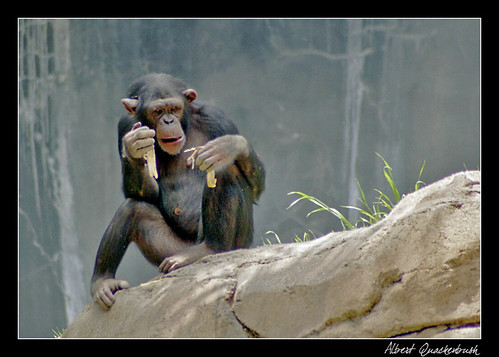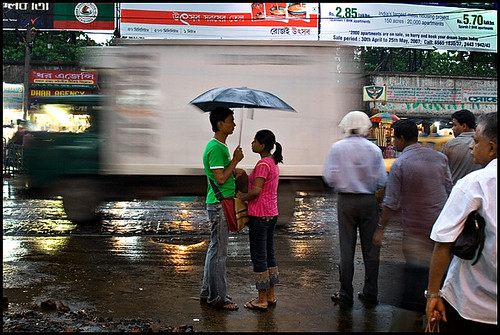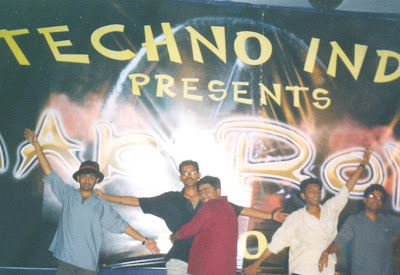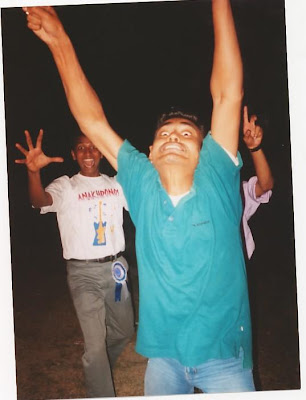Monday, December 31, 2007
Sunday, December 30, 2007
Friday, December 28, 2007
চব্বিশ ডিগ্রি সেলসিয়াস
-- সৃজন কুন্ডু
চব্বিশ ডিগ্রি সেলসিয়াসে হেমন্ত আনলে কেমন হয় !
মনিটর থেকে সব কোড নিয়ে গেছে কেউ...
আইকনগুলো সব খসে পড়েছে...
Recycle Bin ভর্তি হয়ে উপছে পরছে মোছা file
অথচ এটা কোন ভাইরাসের দূঃসাহসী কীর্তি নয়...
কবিতায় এই সব অদ্ভুত শব্দের ব্যবহার হয়ত অচল
কিন্তু জীবনটাকে গ্রাস করে আছে এরাই ,
desktop এর short cut এ click করে আমবাগানে যাবো,
আমবাগানে আমের মুকুলের সেই চেনা গন্ধ......
চব্বিশ ডিগ্রিতে আম ফলবে ?
জানা নেই !!
Thursday, December 27, 2007
ছাগলছানা লাফিয়ে চলে...
ছাগলছানা লাফিয়ে চলে৷
জাহাজ ভাসে সাগর জলে৷
ঝাড়ু হাতে এলো কানাই,
ঞ চড়ে নাচছে দুভাই৷
টিয়াপাখীর ঠোঁটটি লাল,
ঠাকুরদাদার শুকনো গাল৷
Wednesday, December 26, 2007
Bridging the Day
Bridging the Day
Silhouette of Howrah Bridge (Kolkata, India) against the setting sun
Monday, December 24, 2007
Merry Christmas 2007
Wishing each of you a Merry Christmas and a Happy New Year!!
Friday, December 21, 2007
Wednesday, December 19, 2007
sound of silence / mounomukharata
-Simon And Garfunkel
Hello darkness, my old friend,
Ive come to talk with you again,
Because a vision softly creeping,
Left its seeds while I was sleeping,
And the vision that was planted in my brain
Still remains
Within the sound of silence.
In restless dreams I walked alone
Narrow streets of cobblestone,
neath the halo of a street lamp,
I turned my collar to the cold and damp
When my eyes were stabbed by the flash of
A neon light
That split the night
And touched the sound of silence.
And in the naked light I saw
Ten thousand people, maybe more.
People talking without speaking,
People hearing without listening,
People writing songs that voices never share
And no one deared
Disturb the sound of silence.
Fools said i,you do not know
Silence like a cancer grows.
Hear my words that I might teach you,
Take my arms that I might reach you.
But my words like silent raindrops fell,
And echoed
In the wells of silence
And the people bowed and prayed
To the neon God they made.
And the sign flashed out its warning,
In the words that it was forming.
And the signs said, the words of the prophets
Are written on the subway walls
And tenement halls.
And whisperd in the sounds of silence.
Mounomukharata
- Chandrabindoo
Khaniker ei stabdhata drishtir nibadhdhata
elomelo hawa chulgulor niyamita abadhyata
Anguler fanke charminer cabiner majhe andhakar
tabuo moner arale roye jaay je katha...mounomukharata
Eto kache tabu achena mukhe aj kichu roche na
Baralei haat pawa jaay sangshay tabu ghoche na
Hote pare eta abhinay tabu eituku manda noy
Ekhono haat baralei pawa jaay chhnoya jaay
Anguler pelabata
Sammatir protyashay infution cholke jaay
Jadi gori ek taajmahal enke nebo ek kobitay
Amar-i chokhe mishti se rimjhimjhim brishti se
Tabuo se je na bola-i thake hay je katha
Duchokher nirabata diye jaay ki barota...mounomukharata
Tuesday, December 18, 2007
Monday, December 17, 2007
Google Founders
Ben Margot/Associated Press
Google's chief executive, Eric Schmidt, top, with the co-founders of the company, Sergey Brin, left, and Larry Page.
October 30, 2005
Google Wants to Dominate Madison Avenue, Too
By SAUL HANSELL
Mountain View, Calif.
IN many ways, Larry Page and Sergey Brin seem an unlikely pair to lead an advertising revolution. As Stanford graduate students sketching out the idea that became Google, the two software engineers sniffed in an academic paper that "advertising-funded search engines will inherently be biased toward the advertisers and away from the needs of consumers."
They softened that line a bit by the time they got around to pitching their business to venture capitalists, allowing that selling ads would be a handy safety net if their other, less distasteful ideas for generating revenue didn't pan out.
Google soared in popularity in its first years but had no meaningful revenue until the founders reluctantly fell on that safety net and started selling ads. Even then, they approached advertising with the mind-set of engineers: Ads would look more like fortune cookies than anything Madison Avenue would come up with.
As it turned out, the safety net was a trampoline. Those little ads - 12 word snippets of text, linked to topics that users are actually interested in - have turned Google into one of the biggest advertising vehicles the world has ever seen. This year, Google will sell $6.1 billion in ads, nearly double what it sold last year, according to Anthony Noto, an analyst at Goldman Sachs. That is more advertising than is sold by any newspaper chain, magazine publisher or television network. By next year, Mr. Noto said, he expects Google to have advertising revenue of $9.5 billion. That would place it fourth among American media companies in total ad sales after Viacom, the News Corporation and the Walt Disney Company, but ahead of giants including NBC Universal and Time Warner.
Not content to just suck advertising dollars from Web search, Google is using its windfall to pay for an eclectic range of ambitious projects that have the potential to radically disrupt other industries. Among other things, it is offering to build a free wireless Internet network in San Francisco, plans to scan nearly every book published and is testing a free classified advertising system it calls Google Base.
More quietly, Google is also preparing to disrupt the advertising business itself, by replacing creative salesmanship with cold number-crunching. Its premise so far is that advertising is most effective when seen only by people who are interested in what's for sale, based on what they are searching for or reading about on the Web. Because Google's ad-buying clients pay for ads only when users click on them, they can precisely measure their effectiveness - and are willing to pay more for ads that really sell their products.
HIDDEN behind its simple white pages, Google has already created what it says is one of the most sophisticated artificial intelligence systems ever built. In a fraction of a second, it can evaluate millions of variables about its users and advertisers, correlate them with its potential database of billions of ads and deliver the message to which each user is most likely to respond.
Because of this technology, users click ads 50 percent to 100 percent more often on Google than they do on Yahoo, Mr. Noto estimates, and that is a powerful driver of Google's growth and profits. "Because the ads are more relevant," he said, "they create a better return for advertisers, which causes them to spend more money, which gives Google better margins." (Yahoo is working on its own technology to narrow that gap.)
Google already sells its text ads for many other sites on the Internet (including nytimes.com), and is also moving tentatively to sell the picture-based interactive advertising preferred by marketers who want to promote brands rather than immediately sell products. Now it is preparing to extend its technology to nearly every other medium, most significantly television. It is looking toward a world of digital cable boxes and Internet-delivered television that will allow it to show commercials tailored for each viewer, as it does now for each Web page it displays.
Eric E. Schmidt, Google's chief executive, explains the company's astounding success in advertising - and reconciles it with the founders' distrust of hucksterism - by suggesting that advertising should be interesting, relevant and useful to users. "Improving ad quality improves Google's revenue," he said in an interview at the company's headquarters, known as the Googleplex. "If we target the right ad to the right person at the right time and they click it, we win."
This proposition, he continued, is applicable to other media. "If we can figure out a way to improve the quality of ads on television with ads that have real value for end-users, we should do it," he said. While he is watching television, for example, "Why do I see women's clothing ads?" he said. "Why don't I see just men's clothing ads?"
The media and advertising industries certainly see a future in which television ads are aimed at individual viewers. But few outside of the engineering Ph.D.'s at Google think that television ads should simply be utilitarian, rather than entertaining, provocative or annoyingly repetitive - the models that have worked so far. And some media industry executives wonder whether Google, which has already become the most powerful force in Internet advertising, should also become the clearinghouse for ads of all types - a kind of advertising Nasdaq.
"For all of us to throw all our eggs in the Google basket is dangerous, because no one should have that much power," said Jeff Jarvis, a veteran magazine editor who publishes BuzzMachine, a blog about the media, and is a consultant for About.com, a division of The New York Times Company. He added that if Google were to expand its ad sales to other media outlets, prices would fall. "Google commoditizes everything," he said.
There is no better example of that than Google Base, a service that allows users to post all sorts of information free, including classified ads, he said. Newspapers, which increasingly use Google to sell ads on their own Web pages, will see Google Base as a "frontal assault" on their lucrative classified-ad business, and they will say, "I can't trust Google," Mr. Jarvis said.
Mr. Brin said that preliminary versions of Google Base leaked onto the Internet and that the company's partners should not fear it. "Google Base is as much about classified as it is about zoology," he said.
Larry Page and Sergey Brin were exceedingly ambitious from the day they started Google, but the job of finding some source of revenue fell to Omid Kordestani, an amiable former Netscape sales executive who was brought to the company in 1999 by K. Ram Shriram, another Netscape alumnus and an early Google investor. Mr. Kordestani explored a range of ideas, including charging users for searches as well as selling Google's technology to corporations or to other Web sites - notably Yahoo - that were less shy about selling ads.
Eventually, in 2000, Google started to sell ads on its own site, but they were only a few lines of text placed above the search results. There were no graphics and no banners. At first, these ads - and later, a second form of text advertisement that ran down the right side of the page - were sold at fixed prices. But such an approach would not last long.
In early 2002, a Google employee, Salar Kamangar, now 28, convinced Mr. Schmidt and the founders to switch to an auction-based system like the one set up by Bill Gross, the head of IdeaLab. Mr. Gross had created Goto.com, a search engine made up entirely of ads, where advertisers paid only if their ad was clicked on, and the advertiser who bid the most per click was listed first. (Goto was later renamed Overture Services and then bought by Yahoo, an early Google backer that has become its fiercest rival.)
Mr. Kamangar, though, had an important improvement on the model. Rather than giving priority to the advertisers that bid the most per click, as Goto did, he realized that it was better to save the front of the line for ads that brought in the most money - a combination of the bid and the number of clicks on the ad. This was not only more profitable, but it also linked readers to ads that were more relevant to them. He also figured out that the system should use what is called a Vickrey auction - that is, to charge the winner only one cent more than the second-highest bidder. That gives advertisers an incentive to bid high, knowing that they will not be penalized if they are far higher than the rest of the market.
Mr. Page and Mr. Brin were suspicious of any system that put high-bidding advertisers at the top, Mr. Kamangar said. "They thought if someone was willing to pay more it was a negative," he recalled. But he was able to convince them that the site could be improved by incorporating how often users clicked on an ad.
Mr. Schmidt, who was still new as chief executive, was worried more that moving to an entirely auction-based system - amid a recession in online advertising - could be financially disastrous. "I said to Salar, 'Promise me the revenue won't go down,' " Mr. Schmidt said. "I was afraid people would realize these ads were worthless." In fact, revenue quickly increased tenfold.
As Google's audience took off, advertisers came running - many thousands of smaller ones at first, but soon large companies as well. Among Google's largest advertisers is eBay, which has long bought keywords for nearly every sort of merchandise it sells.
"The smartest thing that Google did was getting smaller advertisers to buy in," said Ellen Siminoff, the chief executive of Efficient Frontier, an agency that helps advertisers manage their campaigns on search engines. She estimates that Google has two to three times as many advertisers as Yahoo does, largely because Yahoo has a 10-cent minimum bid. This lets Google earn money on more obscure search terms for which rivals have no ads.
This growing advertising business gave Google the confidence to expand its audience. Most significantly, in 2002, America Online brought in Google to replace Overture, which provided both search and search ads; that deal enshrined Google as the premier search engine and ad network. Google won the deal by guaranteeing AOL a substantial sum, which it would not disclose. Google was willing to make that bid only because of its confidence in its advertising sales prowess. "If we were wrong," Mr. Kordestani said, "there were some scenarios that would bankrupt the company."
But by that point, Google had figured out that the same sort of computing and engineering skill that it used to find Web pages could also be used to improve the quality and, ultimately, the profitability of advertising. "Initially, we didn't understand how fundamental the computer science was in advertising," Mr. Schmidt said. "We didn't have enough staffing or focus on this area. I managed to fix that."
GOOGLE introduced its current system for determining which ad to show on which page late last year. It is a wonder of technology that rivals its search engine in complexity. For every page that Google shows, more than 100 computers evaluate more than a million variables to choose the advertisements in its database to display - and they do it in milliseconds. The computers look at the amount bid and the budget of the advertiser, but they also consider the user - such as his or her location, which they try to infer by analyzing the user's Internet connections - as well as the time of day and myriad other factors Google has tracked and analyzed from its experience with advertisements.
"If someone is coming from a particular location, a certain ad may be more popular there," explained Jeff Huber, Google's vice president for engineering. "The system can use all the signals available, and the system itself learns the correlations between them."
This technology is both amazing and potentially frightening. Google already collects and keeps vast amount of data about what Web pages and advertisements each of its users click on, and it can evaluate that history - and compare it with that of hundreds of millions of other users - to select the ad shown on each page. For now, Google says it identifies users only by a number in a cookie it places on each computer that uses Google. It says it has not connected the vast dossier of interests and behavior to specific users by name. But that could change as Google offers more personal services - like e-mail messages and social networking - and works more tightly with partners who already have such personal information.
Lauren Weinstein, the founder of the Privacy Forum, said the data that Google collects creates troubling privacy issues, especially because it declines to say what data it keeps or for how long. "If you start to target people based on a corpus of data, it can be abused in various ways internally and externally by organizations and government agencies," he said. Government investigators and lawyers in civil suits regularly get court orders to force Internet companies to reveal e-mail messages and other personal information about users.
Google recently rewrote its privacy policy to make it easier to understand what data it collects, but it did not scale back its data retention. Nor did it, as Mr. Weinstein and others have demanded, give users the right to see the data collected about them and their computers.
For now, the only personal information Google says it considers is the user's location, which allows it to display ads for local merchants. It is starting to encourage other Web sites to send it the ZIP codes of their registered users so Google can display ads relevant to their location.
Mr. Brin said he was not sure what other information about users might prove useful, but he said Google would not use the data inappropriately. "I don't think it's a big deal to show opera glasses to someone searching for binoculars that you somehow infer is a woman," he said. "But you don't want to pop up ads for H.I.V. drugs on someone's page, because you inferred they have H.I.V., when their boss is standing there looking at their computer."
To be sure, other Web sites are far more aggressive in using personal information. Yahoo will let marketers display ads to users based on demographic information the users provide as well as the users' surfing and searching history. Microsoft's new system for MSN explicitly allows advertisers to bid different prices for clicks from users of different ages, sexes and locations.
In addition to selling ads on its own site and on other sites that use its search technology, Google also places text ads on all manner of sites published both by professional media companies and by amateurs. Mr. Brin created this program in early 2003 after he became worried that the Internet crash would keep people from creating interesting Web pages for Google to index. This technology, called AdSense for Content, has made advertising on Google more attractive and provided the economic foundation for the rise of blogs.
"God bless Google," said Mr. Jarvis, the BuzzMachine blogger. "They took the cooties off citizen media." Until Google's program came along, advertisers shied away from placing ads on individual user's pages. But AdSense analyzed each page and tried - not always successfully - to find ads related to the page's content.
Now Google is looking to expand its advertising into even more places. It is testing a plan to buy pages in magazines on which to place text ads. And it also shows ads as users browse its new book search service. "A lot of the world's content is not accessible today and thus it is not easily monetizable today," Mr. Kordestani said. "We will figure out how to get more and more content and find the right way to put ads on it."
Advertisers, meanwhile, have had to scramble to adapt to this completely different approach to buying ads. They needed to find ways to keep track of bids on thousands of keywords, and to measure which ads, tied to which keywords, produced which sales - and then to figure out if they had bid the right amount for the ad.
Many advertisers and their agencies have a powerful love-hate relationship with Google. They find it a meaningful source of leads and sales, and the effectiveness of Google's ads is much easier to measure than that of traditional media. But Google has sometimes been hard to deal with. There is a growing sense that a significant number of clicks that advertisers pay for are fraudulent - made by competitors trying to deplete advertising budgets or by Web sites trying to bolster the revenue they get for displaying the ads. Google says it has technology to minimize what is called click fraud, but many people in the Internet business are skeptical that the incidence of fraud is as low as Google contends.
Here, as in other places, many advertisers criticize Google for being like a black box, because the company gives them less specific information and control than they would like. Until recently, for example, advertisers could not specify where their ads ran, though they were convinced that some Web sites in Google's network were much more likely than others to send them customers. Google responded with what it calls "smart pricing" technology that discounts certain ads if Google's analysis shows that they are seen on sites it determines are less likely to produce paying customers. But Google discloses little about how this works, and advertisers find it frustrating.
"Google is very opaque and bizarre to deal with," said Joshua Stylman, a managing partner at Reprise Media, a search advertising agency, but he added that Google had become somewhat more responsive in recent months.
Mr. Schmidt addresses those complaints by saying that advertisers are missing the point of Google's new model. It shouldn't matter what Google does with their ads, he argues, so long as the received value, which advertisers can measure, is higher than the price they pay. The entire discipline of media planning, which has long been important on Madison Avenue, may be rendered obsolete - just as Google's fully automated news Web site threatens the livelihoods of human news editors.
In any case, there is little doubt that Mr. Schmidt believes that science will replace much of the art of marketing. "I have this fantasy that goes like this," he said at one point. "You are the C.E.O. of a large company, and I come to you and say, 'Give me $1 million and give me your Web site, and we will guarantee you will get $100 million in sales.' Which C.E.O. would turn that down?"
Google isn't quite pursuing that sort of deal, but it is trying to have big retailers link their inventory systems directly to its advertising auction. That way, a toy store chain, for example, could respond to a search for dolls with an ad for either Barbies or Bratz, depending on which were overstocked in the store near the user's home. "Most retailers only advertise 5 percent of their products," said Tim Armstrong, Google's vice president for ad sales. "We can let them advertise all of them."
ON the other end of the spectrum, Google is also trying to focus on what the Internet market calls branding advertising - the sort that dominates television and magazines and creates awareness of a product, but doesn't directly call on viewers to buy right away. Yahoo, AOL and MSN have all evolved the simple rectangular banner ad into much more elaborate units with animation, interactivity and sometimes video formats that have been embraced by national advertisers.
Google has been able to convince some companies that its text ads can help build awareness of their products, even if people don't click on them to buy something. But top executives are also meeting weekly to develop a broader strategy for branding advertisements. Google has already allowed its so-called publisher network - those non-Google sites for which it sells ads - to accept advertising with limited graphics. At first, these were simple images, perhaps with a little animation. It is now moving to accept ads that use the popular Flash technology that allows for more interactivity. So far, these nontext ads have been only a tiny part of Google's business.
Indeed, such ads shine a spotlight on the mental compromise that Mr. Brin and Mr. Page made when they overcame their initial objections to advertising on their service. Text ads, they argued, were not the normal fluff of Madison Avenue, but actual information that was useful to searchers.
"Advertising was not a business built by logic, and we don't work by algorithm," said Wenda Harris Millard, Yahoo's chief sales officer. "Yes, we need to be more accountable, but that doesn't mean you sacrifice art and creativity."
Mr. Schmidt acknowledges that as Google explores moving into television, it may well face a conflict between its core belief that advertising must be useful and the typical television commercial that is "based on feeling and emotion."
"Our model is likely to affect television last," he said, while expressing optimism that a formula for useful, targeted commercials could be found. For now, he quickly added, the market for various forms of direct marketing is three times larger than that for television ads. "I was shocked by this," he said. "All of us are so conditioned to television as the height of advertising.
"We are in the really boring part of the business," Mr. Schmidt concluded, "the boring big business."
Copyright 2005 The New York Times
Saturday, December 15, 2007
Friday, December 14, 2007
Thursday, December 13, 2007
pyancha aar pyanchani
Wednesday, December 12, 2007
Tuesday, December 11, 2007
Monday, December 10, 2007
dada, amra bhulini ... bhulte pari na.. bhola sambhab na

Sourav Ganguly reaches his elusive Test double-century, India v Pakistan, 3rd Test, Bangalore, 2nd day, December 9, 2007 .
http://content-ind.cricinfo.com/ci/content/image/324512.html
Friday, December 7, 2007
Thursday, December 6, 2007
Wednesday, December 5, 2007
Tuesday, December 4, 2007
mere paas hai tu mere paas hai
dekho chhod ke kis raste wo jaate hain
saare raste vapas mere dil ko aate hain
nahin saamne, nahin saamne ye alag baat hai
nahin saamne, nahin saamne ye alag baat hai
mere paas hai, mere paas hai tu mere paas hai
mere paas hai tu mere paas hai
mere saath hai,mere saath hai
tera naam maine liya hai yahan
mujhe yaad tune kiya hai wahan
tera naam maine liya hai yahan
mujhe yaad tune kiya hai wahan
bade zor ki aaj barsaat hai
bade zor ki aaj barsaat hai
mere paas hai tu mere paas hai, mere paas hai tu mere paas hai
mere saath hai, mere saath hai
bichhad ke bhi mujhse juda tu nahin
khafa hai magar bewafa tu nahin
bichhad ke bhi mujhse juda tu nahin
khafa hai magar bewafa tu nahin
mere haath mein hi tera haath hai, mere haath mein hi tera haath hai
mere paas hai tu mere paas hai, mere paas hai tu mere paas hai
mere saath hai, mere saath hai
mere pass hai, mere pass hai
mere saath hai, mere saath hai
mere pass hai, mere pass hai
kabhi alvida na kehna
Chalte Chalte Mere Yeh Geet Yaad Rakhna
Kabhi Alvida Na Kahna
Chalte Chalte Mere Yeh Geet Yaad Rakhna
Kabhi Alvida Na Kahna
Kabhi Alvida Na Kehna
Rote Hanste Bas Yunhi Tum
Gungunate Rahna
Kabhi Alvida Na Kehna
Kabhi Alvida Na Kehna
Pyar Karte Karte Hum Tum Kahin Kho Jayenge
Yunhi Baharon Ke Aanchal Mein Chhup Ke So Jayenge
Pyar Karte Karte Hum Tum Kahin Kho Jayenge
Yunhi Baharon Ke Aanchal Mein Chhup Ke So Jayenge
Sapno Ki Duniya Mein Tum Yunhi Bulate Rahna
Kabhi Alvida Na Kehna
Kabhi Alvida Na Kehna
Chalte Chalte Mere Yeh Geet Yaad Rakhna
Kabhi Alvida Na Kahna
Chalte Chalte Mere Yeh Geet Yaad Rakhna
Kabhi Alvida Na Kahna
Kabhi Alvida Na Kehna
Beech Rah Mein Dilbar Bichhad Jaye Kahin Hum Agar
Aur Sooni Si Lagey Tumhe Jeevan Ki Yeh Dagar
Beech Rah Mein Dilbar Bichhad Jaye Kahin Hum Agar
Aur Sooni Si Lagey Tumhe Jeevan Ki Yeh Dagar
Hum Laut Ayenge Tum Yunhi Bulate Rehna
Kabhi Alvida Na Kehna
Kabhi Alvida Na Kehna
Chalte Chalte Mere Yeh Geet Yaad Rakhna
Kabhi Alvida Na Kahna
Chalte Chalte Mere Yeh Geet Yaad Rakhna
Kabhi Alvida Na Kahna
Kabhi Alvida Na Kehna
Monday, December 3, 2007
Main Aur Meri Tanhai
Friday, November 30, 2007
Sokhi bhalobasa kare koy?
Sokhi bhabona kahare bole?
Sokhi jathona kahare bole?
Tomra je bolo dibosh-o rojoni bhalobasa bhalobasa
Sokhi bhalobasa kare koy?
Seki keboli jathona moy
Seki keboli chokher jhol
Seki keboli dukher shashhhh
loke tobe kore ki sukheri tore, amon -o dukhero aash!!
Abhiman na Bhalobasa
was just browsing flickr randomly.. and got this awsome snap :)
Wednesday, November 28, 2007
Sourav Ganguly - Winning is Everything
The video is about the man of ATTITUDE - a NEVER SAY DIE attitude, it's about the man who never quits no matter how odd the circumstances are, it's about the man who made the best ever comeback in the history of World Cricket.
Yes!!! It's about SOURAV GANGULY, the "MAHARAJ" of TEAM INDIA , the "Prince of Kolkata".
It's a try to give tribute to this great personality who has inspired me the most.
Hats off to his DADAGIRI
- Gaurav Tomar
visit at www.souravchandidasganguly.blogspot.com
http://www.youtube.com/watch?v=vj6kPrk4nj4
Tuesday, November 27, 2007
Vidyasagar-Setu-Kolkata-7
i was randomly searching flickr.. and got this awsome snap :)
Monday, November 26, 2007
Friday, November 23, 2007
singhasan
balish , toshok , kantha , madure , papose...
hasi , raag , abhiman, jhagra aposhe....
Wednesday, November 21, 2007
Bangali babu
Am I not looking good in traditional bengali dress?
Tuesday, November 20, 2007
anu
Friday, November 16, 2007
সৃজন কুন্ডু
ইন্টারনেট
পরামর্শ: "অনুসন্ধান" বোতামে ক্লিক না করে "Return" বা "Enter" কী চেপে সময় বাঁচানো যায়
আপনার অনুসন্ধান - সৃজন কুন্ডু - কোনো পৃষ্ঠাতে পাওয়া যায়নি।
পরামর্শ:
দেখুন যে সব বানান ঠিক আছে কি-না
অন্য বিষয়বস্তু ব্যবহার করে চেষ্টা করুন
আরও সাধারণ বিষয়বস্তু দিয়ে চেষ্টা করুন
স্বল্প বিষয়বস্তু দিয়ে চেষ্টা করুন

















































